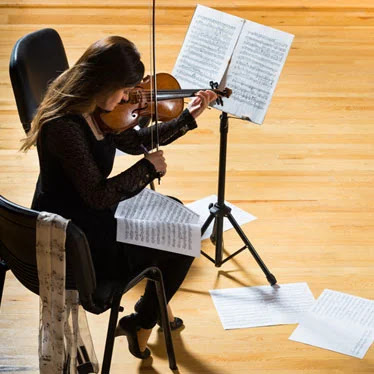It's all about the classical music composers and their works from the last 400 years and much more about music. Hier erfahren Sie alles über die klassischen Komponisten und ihre Meisterwerke der letzten vierhundert Jahre und vieles mehr über Klassische Musik.
Total Pageviews
Wednesday, January 21, 2026
Wednesday, July 2, 2025
Tuesday, May 13, 2025
Friday, May 2, 2025
Thursday, April 24, 2025
Saturday, March 29, 2025
Saturday, January 11, 2025
Thursday, January 12, 2023
Is this music or can it be deleted?
The relationship between music and memory is powerful. Music evokes powerful emotions that then bring back memories. When we listen to a piece of music from years ago, we seem to travel back to that moment. We can feel everything as if we were there.
Our long-term memory can be divided into two distinct types, namely implicit memory and explicit memory. Explicit memory is a deliberate, conscious remembering of the past. Explicit memory involves things like textbook learning or experiential memories, things that must be consciously brought into awareness.
Implicit memories are our unconscious and automatic memories. For example, playing a musical instrument, or recalling the words to a song when someone sings the first few words. A large part of memory takes place in the unconscious mind.
Explicit memory fades in the absence of recall, while implicit memory is more enduring and may last a lifetime even in the absence of further practice. The explicit memory systems become damaged by conditions such as Alzheimer’s disease.
I remember my parent's irritation in their faces, such as a broken mirror! Once upon a time, we have been getting crazy while listening to our idols' sounds. In my case, sometime during the 1960s and 1970s.
I felt "satisfaction" while listening to the Rolling Stones or dancing to the Beatles. I had hectic dreams together with Pink Floyd or couldn't hold myself with "Da-da-da_ and its then "German New Wave which swapped to the world later on - yes, even up to the Philippines.
Today, we are the parents of the younger generation again. Is there diplomatic space for any discussions? What's the music up nowadays?
Rap or house? Or something like this? Noise, din, row, racket, fuss, or damage to my (?) musical paintwork?
I remember harmonic accords with flutes and my accordion. Later myself at the piano ... .
Two generations, even three meanwhile. Let's strike the right one - no matter which generation we belong to.
Shahram Heshmat, Ph.D., an associate professor emeritus at the University of Illinois at Springfield with a Ph.D. in Managerial Economics from Rensselaer Polytechnic Institute, describes it as follows: " In sum, music can help to unlock non-musical memories and promote communication in older adults with Alzheimer's disease. Recalling a memory is not always easy. It doesn’t simply come when you want to retrieve it. However, music helps to recall all the memories that you’ve connected with a song. Listening to a piece of music that was played a lot during a significant life event, such as a wedding or funeral, can trigger a deeply nostalgic emotional experience".
Friday, November 25, 2022
No Introduction Needed? Thoughts on How to Introduce the Music Appropriately Before a Performance
By Frances Wilson, Interlude
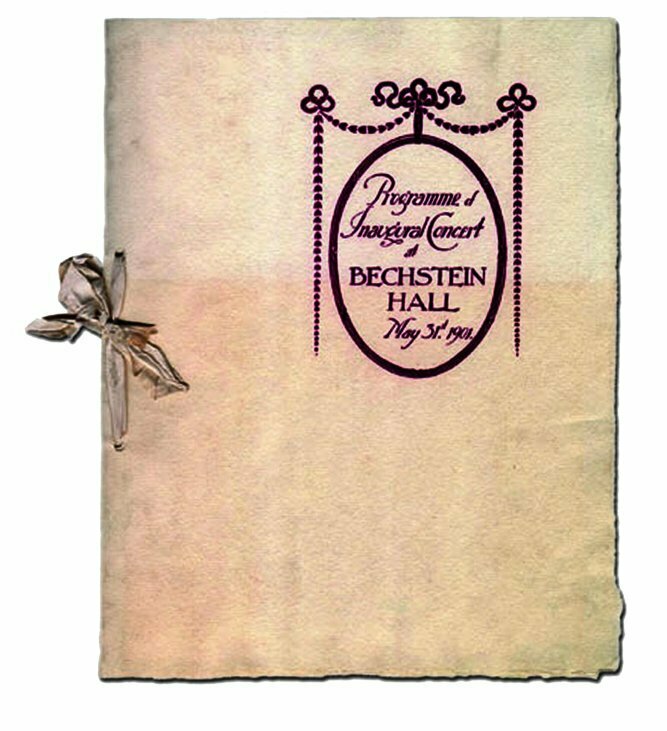
There is a growing trend amongst concert hosts and performers to introduce the music to be performed ahead of the concert, and on radio for presenters to describe the music in some detail immediately before it is broadcast. Such presentations can offer the audience a different perspective on what they are about to hear from the printed programme notes and may reveal special or personal insights into the music. I think audiences have a great fascination in the “behind the scenes” work of musicians, especially soloists such as concert pianists, and a performer’s own introduction to his or her programme provides a more personal view on the music, allowing performer to discuss why they chose this repertoire, what makes it special for them and, particularly in the case of modern or new music, give the audience some “listening notes” to help them find their way through the music.
Such introductions may also create a more intimate link between performer and audience, breaking down the “us and them” atmosphere which can sometimes pervade the concert hall. A good introduction will encourage engaged and empathetic listening from audience and a sense of mutual communication and cooperation between performer and listeners.
It can be frustrating, therefore, when presenter or performer tries to tell the audience “how to listen”. I would prefer presenters not to preface a work with gushing purple prose, telling us that this music is “beautiful”, “absolutely gorgeous”, “fiery”, “dramatic” etc. Listening to music, whether in a live concert, on disc or on the radio is a highly personal and subjective experience, one which taps into one’s emotions to create an individual response. My version of “beautiful” or “dramatic” music will not be the same as yours, and to influence the listener by describing music in this way or telling us how to listen may deprive us of the uniqueness of the listening experience. Equally, audiences and listeners are not stupid and do not need to be ‘helped’ through the music or given obvious musical ‘signposts’ to listen out for before we’ve even heard a note. And a long verbal introduction to a piece can make one impatient to hear the actual music.
Sometimes in pre-concert presentations, extracts from the music in the programme are played to introduce the music or illustrate a point or to ‘help’ the audience. Such extracts can be enlightening and informative, but equally they can feel strangely disconnected when taken out of the context of the entire work or the programme as a whole.
I actually enjoying hearing a piece of music “cold”, so to speak, without any introduction, allowing the sounds to seep into my aural landscape and my consciousness, wondering where the music will go, without an introduction via a verbal or written programme note. Sometimes we need to be surprised, delighted, shocked or enraptured, and at other times it can be satisfying to “work” at listening (and I have never regarded listening as an entirely passive activity: some engagement is required, whatever the genre of music). We can take pleasure in our personal discoveries, our unique responses to what we’re hearing, the thrill of the unknown or the unfamiliar.
Music comes out of silence and through it we can escape from the noise of everyday life, the unending onslaught of images, messages, videos, memes…
Monday, October 24, 2022
Why Is This Music So Memorable? How to Train Your Dragon
Friday, April 29, 2022
Music 101 – A Foray into Understanding Classical Music
by Janet Horvath, Interlude
Introduction to Classical Music
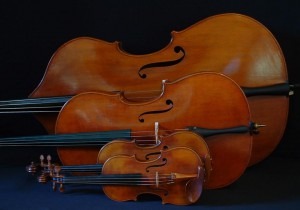
The Strings
I’ve been a professional classical musician for more decades than I care to disclose. By far the most common comment I’ve heard (other than, “Why, that cello is bigger than you are!) is— “I don’t know anything about classical music. I like it, but I just don’t understand it.”
I invite these doubtful audience members to relax and listen. I assure them that one doesn’t necessarily need to “know” anything to enjoy the music.
In an attempt to rectify this seemingly insurmountable obstacle for some people toward classical music, I’m embarking on a series for the uninitiated, which we will call Music 101. I will devise some interesting materials and quizzes so that people new to certain classical repertory will know what to listen for. I hope to cover, with the help of my fellow Interlude writers: Everything You Always Wanted to Know About Music. Don’t be afraid to ask about particular questions you are burning to have explained.
Introducing the Orchestral Instruments
First, I thought we should start with the instrument families of the orchestra.
The strings are by far the largest group of instruments in the orchestra—the violins, the violas, the cellos and the double basses. All of the stringed instruments are played with a bow, strung with horsehair. The larger the instrument the lower is their sound. Their four strings get thicker and longer too of course. They are beautiful works of art, carefully hand crafted of wood. The older instruments are like fine wines that have aged, honing their beautiful sound. Some of the most coveted stringed instruments of a maker hailing from Cremona Italy, (and the most expensive), are those made by Italian master luthier, Antonio Stradivarius (1644-1737.) He is considered the most significant artisan in the field. It is estimated that Stradivarius made 1,000 to 1100 instruments— violins, violas, cellos and even harps and guitars—and today we are lucky that 650 instruments survive. The varnish that he used on the surfaces of the wood defies analysis even to this day.
Guarneri is the family name of distinguished luthiers also from Cremona, Italy in the 17th and 18th centuries whose standing is comparable to the Stradivarius family. Guarneri del Gesu (1698-1744) made remarkable violins. Many world-class violinists prefer the instruments of Guarneri to Strads! Anne Akiko Meyers owns the “Molitor” Strad and just recently Meyers received the lifetime use of the “Vieuxtemps” Guarneri del Gesu, purchased for her by an anonymous buyer.
Among cellists, two names stand out. Dominico Montagnana (1686-1750) was an Italian master from Venice whose cellos are regarded as exquisite. Lynn Harrell has just announced that he is going to sell his beloved Montangana cello, an instrument he has played on for fifty years. Matteo Goffriler, also Venetian, is particularly noted for his cellos. His cello from 1733 belonged to the great cellist Pablo Casals, which he acquired in 1913 and played throughout his life until his death in 1973. From 1950-1965 Janos Starker played and recorded on the “Aylesford” Stradivarius. In 1965 Starker acquired a Goffriller cello made in Venice in 1705, which he owns to this day.
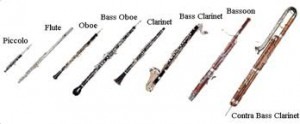
The Woodwinds
Now perhaps you can understand a string player’s reticence to allow anyone to even get near our instruments. Although most of us play instruments of lesser quality, it is like walking around with a priceless one-of-a-kind painting and they are beloved family members.
The woodwinds include the flute, clarinet, oboe, and bassoon and their relatives—the piccolo, the alto and bass flute, the bass clarinet, the basset horn, (clarinet family) the English horn (oboe family) and the contra-bassoon. Once again, the lower frequency instruments are larger. The oboe, clarinet and bassoon are played with reeds—pieces of painstakingly shaped and scraped cane. Usually the oboe and bassoon players shape their own reeds, as the behavior of the reed is the primary factor in the oboe’s quality of sound including the pitch, and the tone quality. The reed contributes to the ease of the production of the sound. Ask any oboe player and they will tell you that they spend unbelievable numbers of hours soaking, binding and scraping reeds, some specifically shaped for certain pieces of music, and even up to the moment before they play. An entire toolkit is required for this process.
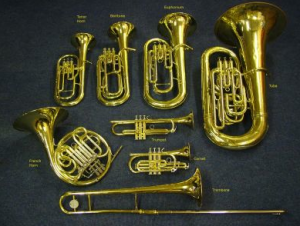
The Brass
The brass instruments are easily identifiable. They are the loudest instruments and are made of the shiny metal— consisting of the trumpets, French Horn, trombone and tuba and their relatives: Piccolo trumpet, cornet and flugelhorn (trumpet family) the euphonium (tuba family) and the more rare Tuben or Wagner horn, which combines elements of the French Horn and the tuba. This instrument was created specifically for Wagner’s’ operatic Ring cycle. French horn players typically play the Wagner tuben. The tuben are finicky instruments, which also appear in the Bruckner Symphonies.
And the granddaddy is the cimbasso! This instrument is in the trombone family The cimbasso encompasses a similar range to the tuba or bass trombone and is played rarely.
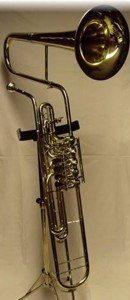
Cimbasso
The percussion family includes any number of instruments to bang, scrub or scrape with mallets or sticks, or to shake and whirl. They are considered to be the oldest musical instruments after the human voice. The orchestra percussion section might include additional instruments that are not strictly percussion instruments per se, like whistles, sirens, bells, and tuned instruments such as the marimba, xylophone, glockenspiel and vibraphone. The timpani or kettledrums belong to their own subgroup as they are tuned to certain pitches. Usually a timpanist is hired in addition to the percussion players. When you see the timpanist lean down as if to put their cheek on the instrument it is to hear the tuning.
Keyboard instruments do make their appearance in the orchestra as well—the piano, celeste, harpsichord and organ.
And finally the harp is a multi-stringed instrument generally categorized in the stringed instrument group but it has its own category. Although there are many sizes of harps including folk, lap and Celtic instruments, the orchestral harp is a large instrument requiring heavy lifting. It has a frame, sound-board and pedals so the instrument can play in different keys. During contemporary music you will see a lot of fancy footwork from the harp player while both of their hands strum the strings.
Benjamin Britten’s A Young Person’s Guide to the Orchestra is a wonderful piece, written to highlight each individual orchestral section separately.
Guide to Music Reading
Reading music is like learning another language. The markings in the sheet music include established symbols. In addition to signs that indicate the time signature, the clef and key signature, we have symbols to indicate length of notes, pauses, tempo markings and dynamic markings, as well as markings for the direction of the bow movements. The tempo marking at the beginning of a movement sometimes indicates speed as well as character. For example, andante means gently as well as slowly. Additionally, the composer often uses either Italian or German words within the piece of music to indicate mood, style or interpretation. We become adept at reading all of these indications simultaneously. Fingerings, though, are typically a matter of a player’s preference.
Of course this is secondary to the task of mastering our instrument! We must learn to coordinate our two hands and/or lips, mouth and fingers to produce a mesmerizing sound. Once we can do that and read the music, then the interpretation can begin. The conductor indicates the emotion and passion with his or her movements, stick technique and facial expressions, to produce one unified concept.
The music is about conveying a mood or emotion. Our response is always subjective as with other art. As individuals what it may conjure up for me might be different for you and even that of the composer. Think of the last movie or theater production that you went to. The music assists in depicting the emotions in the movie—it may inspire feelings such as agitation, apprehension, remorse, bitterness, and elation. It may evoke memories. Just let it wash over you so that you and it will allow you to create your own visual images.
Saturday, April 9, 2022
MAKE MUSIC - NOT WAR!
Thursday, December 2, 2021
MUSIC, CHRISTMAS AND GOD
Are all terms in the right order? In logical sequence? For some of you, my dear readers, they must have passed out by a dozen.
Honestly, writing about political topics is really tiring me. Especially now and today. While writing this piece, I am getting tons of political news.Yes, I am very well understanding everything. But why do I choose "Music, Christmas and God"? Again, the right (or wrong?) order doesn't matter. Really!
Christmas is just around the corner. Almost. I become very thoughtful and melancholy during the season. That's okay. Maybe also you. I try to delete topics such as war, corruption, killing, pandemic,natural disasters et cetera et cetera pp. I even try to delete them here in my opinion. I try to look forward to Christmas with a happy heart.
Christmas is just around the corner. God is with me daily. He is my companion during every second of my life. And, what has this to do with music?
Music has been my second life companion for many years. I remember the day my parents first lugged the heavy accordion up our front stoop, taxing the small frame. They gathered me in the living room and opened the case as if it were a treasure chest. And guys, it really was. And, it was several days BEFORE Christmas.
"Here it is," my parents said. "Once you learn to play it, it will be with you for life!" Thank God, it is. Believe it - up to now. Here in my house in Davao City. My very first instrument... .
Anyway, back to the past: if my thin smile didn't match my parents' full-fledged grin, it was because I prayed for a piano! It was at the end of the 1950s, and I was glued to my AM- and ShortWave Radio Stations, playing classical music 24/7. Accordions were nowhere in my hit parade - even later during the 1960s and 1970s... .
Sometime on a Sunday, one of my favourite days till now, I started taping radio shows with classical music. It seemed that I was hanging on every note. I joined the college band. But I admired classical composers such as Beethoven and Mozart, just to mention two. I never became perfect in my piano play to coax sweet sounds. I also admire people who can do so. But I developed a passion for music.
Music, God - and, yes: Merry Christmas to all of you - also from this corner, even there are still some more days.... .
Thursday, October 21, 2021
Music, Medicine and Happiness
by Desiree Ho , Interlude
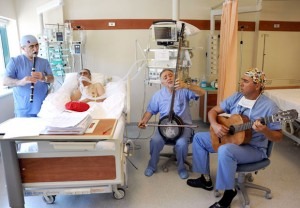
Credit: http://www.telegraph.co.uk/
Music as a non-therapeutic form of medicine
Perhaps you have a friend or family member who suffers from a health problem, such as stroke, depression, Parkinson’s, or is recovering from surgery, and is now looking for other forms of treatment. Well, perhaps music therapy could be the answer.
Music therapy is a growing field of healthcare in which music is used by a qualified professional to help address a patient’s needs through clinical and evidence-based therapy. The aim of music therapy is to reduce the patient’s symptoms, aid healing, and improve physical movement and their overall quality of life.
While the field of music therapy is considered to be relatively young in comparison to more established forms of the therapy, there is no question that music has been used in medicine thousands of years ago.
From the ancient Greek philosophers who believed that music could heal the mind, body and soul, to the native Americans who chanted and sang healing rituals, to the WWII war veterans who used music to help treat soldiers suffering from shell shock, music has a long history in the recovery process.

Credit: https://helpingharmonies.files.wordpress.com/
In the United States, qualified music therapists must have a bachelor’s degree (which spans four years), 1200 hours of clinical training and internship experience and pass a national exam before they can be certified.
In the United Kingdom, one must be registered with the Health and Care Professions Council, which requires successfully completing an approved programme in music therapy.
Here are some examples of how music has proven to be effective:
Stroke
Music shows to be helpful in helping stroke patients recover. A study on the rehabilitation of 60 stroke patients conducted by Särkämö T et. al revealed that recovery in the verbal memory and focused attention improved significantly in the group of patients that were assigned to listen daily to self-selected music than those assigned to listen daily to self-selected audio language tapes, or the control group that did not listen to either.
The group with music also showed to be less depressed and confused than the control group. These findings indicate that listening to music in the early stages of stroke recovery can improve both cognitive neurological recovery and prevent negative moods.
Depression
In a study of patients being treated for depression, 79 participants aged between 18 and 50 were randomized to receive either 20 standard care sessions with music therapy or standard care alone.
In the hour-long sessions, professionally-trained music therapists worked with the patients to learn an instrument.
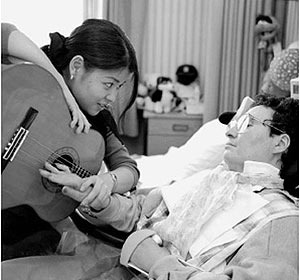
Credit: http://www-tc.pbs.org/
However, it should be noted when these measurements were taken again three months later, the differences between the scores were said to be no longer statistically significant, indicating that music therapy may have short-term benefits, while the long-term benefits are yet to be studied further.
Parkinson’s
Music has also been used for helping people with Parkinson’s disease to regain some of their functioning, and has also shown to improve the quality of life and overall feelings of happiness, as published in “Pyschosomatic Medicine: Journal of Biobehavioural Medicine.
It seems that the music helps stimulate the increase of Dopamine and Serotonin in the brain, which is largely reduced in Parkinson’s patients, helping them to better control their breathing and movement.
Recovering from Surgery
Patients recovering from open-heart surgery also showed to have lower levels of cortisol, a stress hormone, after listening to classical music. In certain cases, listening to music before an operation was more effective than anti-anxiety medications in getting patients to relax.
While these findings are encouraging, we should be aware that music therapy should be used together with conventional treatment. Relying on music therapy alone and avoiding conventional forms of medicine can lead to serious consequences.
Furthermore, music therapy is more than just listening to music and involves regular assessment by a professional, and should be viewed with the same care as in conventional forms of medicine. And while there is evidence that music therapy is beneficial, there are no claims that music therapy can cure diseases.
References
Särkämö T, T., Tervaniemi, M., Laitinen, S., Forsbiom, A., Soinila, S., Mikkonen, M., . . .Hietanen, M. (n.d.). Music listening enhances cognitive recovery and mood after middle cerebral artery stroke. [Abstract]. Brain, 131, 866-876.
Music therapy ‘helps treat’ depression. (2011, August 1). Retrieved January 3, 2014, from NHS choices website: http://www.nhs.uk/news/2011/08August/Pages/music-therapy-for-depression.aspx
Making music can help overcome depression. (2011, August 1). Retrieved January 3, 2014, from The Telepgraph website: http://www.telegraph.co.uk/health/healthnews/8671706/Making-music-can-help-overcome-depression.html
What is Music Therapy? Frequently Asked Questions. (2013). Retrieved January 3, 2014, from American Music Therapy Association website: http://www.musictherapy.org/faq/#39
Music Therapy. (2008, January 11). Retrieved January 3, 2014, from American Cancer Society website: http://www.cancer.org/treatment/treatmentsandsideeffects/complementaryandalternativemedicine/mindbodyandspirit/music-therapy
Music Therapy. (n.d.). Retrieved January 3, 2014, from European Parkinson’s Disease Association website: http://www.epda.eu.com/en/parkinsons/in-depth/managing-your-parkinsons/quality-of-life/creative-therapies/music-therapy/music-therapy-and-parkinsons/
Music Therapy: Classical Music that can heal your souls!
Wednesday, September 22, 2021
How does music affect the culture of the Filipinos?
Music as a whole can be used as an encouraging or depressing way to look at life. In this sense, it plays a big role in shaping the culture and values of people and the rest of the world. We see this through kundiman - it carries sentiments and emotions that evoke memories and images for Filipinos. These may clash with the outside world, but this clash gives us identity: these cultural imprints are then integrated back into society to create our metamorphosis into another era. So it's not just about tradition; it's also about forging new ground for generations to come.
This ever-evolving system creates such wonderful flavours that we're able to adapt ourselves better than ever before--we learn new things and explore different ways to make the best out of them. Music is one way we express ourselves, and through this method, we show our appreciation for humility and hard work, two values that shape our bustling nation into a happy place worth living in.
So what does music really mean to Filipinos? It simply tells us where we've been and where we could go. It tells a story that everyone can appreciate and relate to, which is why it's a big part of every Filipino culture.
Monday, June 21, 2021
7 Steps to Start Your Music Career
Technology has opened a host of new professions and opportunities for people around the world. In fact, the music industry has been part of the growth – changing, expanding and evolving to meet new demands. Instead of competing for traditional jobs in an orchestra, among chamber musicians, or as soloists, emerging string musicians are looking at alternative careers that utilize their skills in new ways.
Undergraduate students have more opportunities than ever to enter a music career. With social media and global communications, the prospects are wide open. In fact, you can build your music career on your own terms. However, there are certain steps you need to take to ensure that you reach the goals you have in mind.
1. Build your entrepreneurial mindset
To forge a new path, you have to be willing to take risks. That’s what entrepreneurs do. They take an idea and develop strategies that will allow them to make it a reality. The most successful use determination and drive to make their vision materialize. This means that you’ll need to learn to write a business plan. There are many free resources available online if you search ‘music business plan.’ Remember, you’ll need to do your homework on this. The greatest idea will fail without the right planning.
2. Understand exactly what you want to do
This is sometimes easier said than done. Perhaps you know you want to have a professional music career, but the exact nature of the idea is rather hazy. While writing your business plan, you’ll discover that you’ll need to outline your specific goal. To understand that point, you'll need to be able to articulate your specific intent. Having a few, explicit sentences ready when people ask you about your plan will also keep you on the path of success. Your intent should outline your immediate and future goals.
3. Build a network of contacts that support your idea
In the music industry, much like other industries, who you know can make all the difference between success and failure. For your career, cultivate relationships with new and old colleagues. People who can help you gather ideas and new perspectives for your career projects. It’s also a good idea to build an advisory board of your closest contacts to help counsel your decisions. Effective entrepreneurs understand that they can’t do it alone. They need alternate insights and other's specialties to succeed.
4. Build your selling skills
This doesn’t mean take a course in used car salesmanship. It means that you need to build your charisma. Can you easily describe your vision so that it inspires others? That’s what you need to cultivate. Your performance ability is just as important as your verbal and written skills. Cover letters, grant proposals and other solicitations require strong communication to be effective. If you can articulate your dream so that it compels others, you’ll be able to achieve your goals faster.
5. Plan your work, work your plan
This adage applies to every activity. In order to realize your short and long term goals, you must plan and then do. Break down the steps you need to accomplish to achieve a specific objective. This means having daily “to-do” lists that work toward the end result. Each objective should be part of the steps required to complete another stage in your plan. Although this is part of your initial business plan, writing down a series of tasks to fulfill each day helps keep you motivated and on track.
6. Utilize the Internet in every way
Successful promotions no longer require huge amounts of money to ensure they work. The Internet has leveled the playing field for a number of business enterprises, including the music industry. You can build a following for your music on social media, websites, and YouTube. If you aren’t really computer savvy, there are self-help books available by the millions. Do a little research before launching your online marketing campaign. You can also employ experts to fulfill that part of the process, but remember, the Internet is essential for building a music career.
7. Employ sound budgeting and outreach strategies
No business can operate without a clear budget. By understanding your income and expenses, you’ll be able to make smart decisions about the next steps in your plan. Also, consider employing an agent, if you don’t already have one. An agent will work from commission, so you can earn funds and keep your performance skills sharp while you’re building your music career.
Establishing a music career has never been easier, but that doesn’t mean the journey won’t be hard. Remember to keep your love of music alive and motivate yourself during the process. It’s rare that entrepreneurs become successful overnight. If you maintain your strategies, you can successfully realize your dreams.
Published by StringOvation Team on July 25, 2017
Thursday, November 5, 2020
Scientists find the amazing reason your favorite music gives you ‘chills’
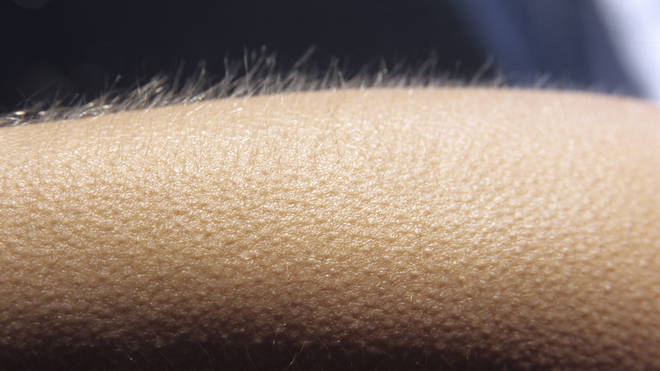
By Maddy Shaw Roberts, ClassicFM London
 |  |
Now we know why our favorite music sends shivers down our spine.
Scientists say they have discovered why the melodies we love give us goosebumps.
A team of French researchers found that when we listen to our favourite music, the areas of the brain which handle emotion, movement, and processing music and sound work together to create a surge in dopamine levels – our ‘feel good’ chemical.
According to the study, our brains also try to anticipate what happens next in the song. And when we guess correctly, we get a reward.
Thibault Chabin, a PhD student at the University Burgundy Franche-Comté who led the study, said: “What is most intriguing is that music seems to have no biological benefit to us. However, the implication of dopamine and of the reward system in processing of musical pleasure suggests an ancestral function for music.
“This ancestral function may lie in the period of time we spend in anticipation of the ‘chill-inducing’ part of the music. As we wait, our brains are busy predicting the future and release dopamine.
“Evolutionarily speaking, being able to predict what will happen next is essential for survival.”
Read more: Music takes 13 minutes to ‘release sadness’ and 9 to make you happy >
The team of researchers, whose study was published in the journal Frontiers in Neuroscience, carried out the experiment on 18 music-lovers with a range of musical abilities, who had all experienced chills when listening to music.
“Participants of our study were able to precisely indicate ‘chill-producing’ moments in the songs, but most musical chills occurred in many parts of the extracts and not only in the predicted moments,” says Chabin.
Side note, interestingly – or tragically, depending on your take! – only about half of people get chills when listening to music. Those who do, are considered to have an “enhanced ability to experience intense emotions”.
For Chabin’s study, the participants were hooked up to machines that record electrical activity in the brain, and they were played 90-second clips of their favourite songs.
While they were listening, the scientists watched what happened in their brains whenever the music gave them ‘chills’.
These regions work together to process music and release the ‘feel-good’ hormone, dopamine. Combined with the anticipation that triggers those pleasurable ‘reward systems’, this produces the tingly chill participants felt while listening.
“This represents a good perspective for musical emotion research,” Chabin said.
“Musical pleasure is a very interesting phenomenon that deserves to be investigated further, in order to understand why music is rewarding and unlock why music is essential in human lives.”
(C) 2020 by ClassicFM London










.jpg)
.jpg)


